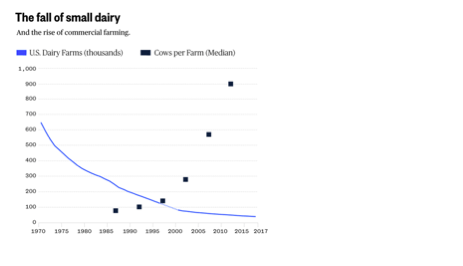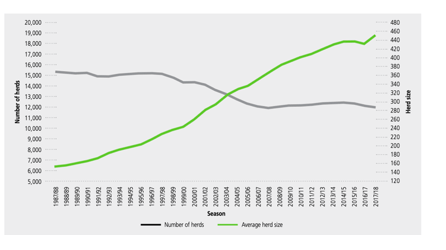
My conclusion was it is hard to find any evidence those government interventions had any lasting positive effect. Here is a similar chart for New Zealand, which includes a line showing the rise in dairy herd size.

The important part of the chart is on the right – for the last 15 years dairy numbers have been essentially constant, even while herd size climbed. What is not shown on this chart is what happened in 1984. Prior to that time government subsidies comprised up to 40% of farm income. Under Minister of Finance Roger Douglas, New Zealand ended all farm subsidies cold turkey. The change was wrenching for the nation’s farmers, but the adjustment period was shorter than most expected. While dairy numbers did continue to decline slowly, the trend was neither drastic nor permanent. From that point on, New Zealand farmers have created their own future.
Nor is this example just applicable for smaller countries like New Zealand. While it does contribute only about 3% of global dairy production it dominates the world export market – exporting about 4 times as much as the US. New Zealand products are found all over the world simply by having farmers who can compete with anybody on their own.
I am aware the U.S. dairy industry, and much of agriculture finds such a system literally unthinkable. Part of the catechism of American farm culture is milk is somehow a special commodity and without complex pricing and subsidy schemes disastrous shortages and economic hardship would occur. The only problem is there is no proof milk wouldn’t be reliably plentiful without subsidies. Indeed, New Zealand shows it can be done. And we already have economic hardship in our dairy industry, with no end in sight. If nothing else, ending subsidies would end complaints about some farmers getter more help than others. It’s time we looked at the Kiwi alternative: setting our agriculture free.












